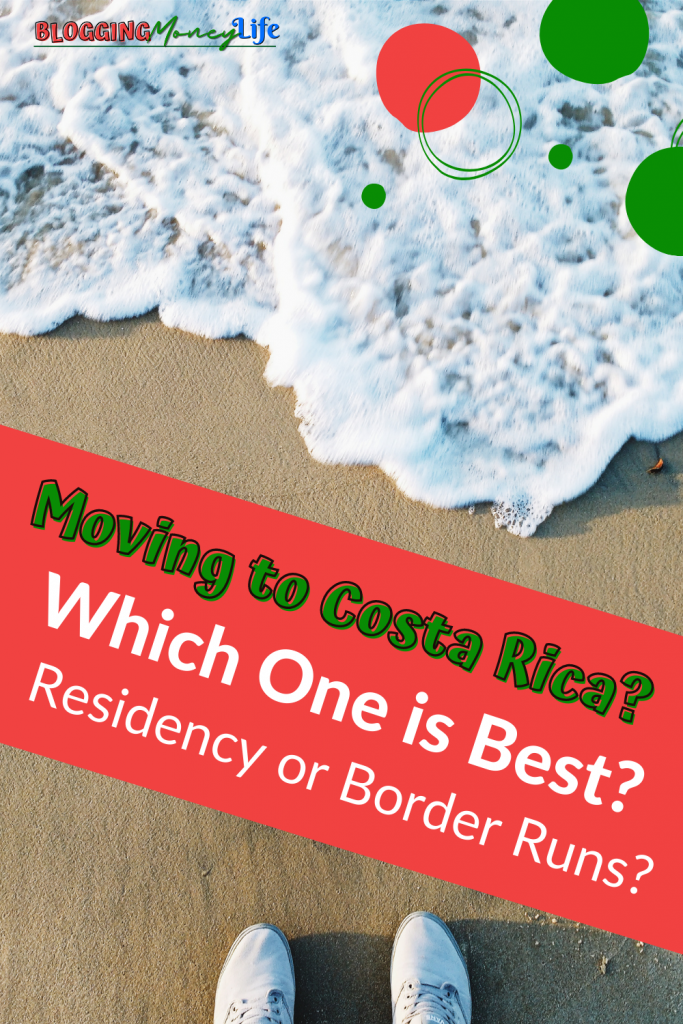Moving to Costa Rica? Residency VS. Border Runs

After months of research, my wife Jasmine (Jas) and I have decided to pack up our lives in San Antonio, TX, and move to Costa Rica. Following this decision to live in Costa Rica long term, we had to determine how to live legally in that tropical country.
Can we simply do the perpetual tourist thing by making border runs to renew our visa, or should we go down the long road to Costa Rica residency?
After announcing our move to Costa Rica on social media, we decided to document our experience on our YouTube channel. So we started a series called Moving to Costa Rica Update. In addition, we are publishing monthly update videos detailing each step we’ve taken.
After posting one of the early videos, we received an intriguing comment from a viewer. He wrote that as an avid traveler, he does not recommend pursuing a permanent residency in Costa Rica. Instead, he said we should wait until we have lived in the country for at least a year and then decide.
But other than stating that “most expats only last about a year or two in any foreign county…” he didn’t explain why he felt this way about our situation.
Now, of course, his comment left us with some questions. Who is this guy? What does he know about moving to Costa Rica that we don’t know?
Did we miss something significant in our research about living in Costa Rica as expected? And what would living in Costa Rica on a 90-day renewable tourist visa be like for us?
Why choose Costa Rica for permanent residence?
Costa Rica is becoming one of the most popular countries in Central America for tourists. However, many tourists love the country to the extent that they consider Costa Rica their home country. We have been in love with Costa Rican culture since we started visiting it regularly.
After being perpetual tourists, we decided to become legal residents of Costa Rica. After considering many factors that would help us become foreign residents of this beautiful country, we decided.
The main factor which attracts us to live in Costa Rica is the diverse culture of this country. Foreign nationals are treated very well by Costa Rican local people. The locals of this country are excellent and friendly. They are always ready to help the visitors and show them their hospitable nature.
All parts of Costa Rica are significant to visit because the locals warmly welcome you. These fantastic people of Costa Rica are one of the main reasons for us to make up our minds and apply for Costa Rican residency.
The second factor is that Costa Rica is an economically and politically stable country. Costa Rican government makes sure to provide every possible facility to their visitors. The national parks are well-maintained to increase the perpetual tourism in the country.
Costa Rica offers a unique opportunity to live in a beautiful, stable, and welcoming country with excellent healthcare, a rich culture, and a commitment to sustainability. So it’s no wonder many expats have made it their permanent home.
How to apply for residency in Costa Rica?
To become a Costa Rican citizen, you should know the process you must go through and become a tax resident of Costa Rica. First, you should go to Costa Rican consulate in your country and set an appointment with the immigration department. There will be an application fee.
Tourist Visa in Costa Rica
Costa Rica has a long-standing relationship with deep ties to the United States. Because of this strong relationship, U.S. citizens are not required to have a visa to enter Costa Rica.
So to get in, we only have to present our passports to immigration, along with an onward ticket to show that we will exit Costa Rica within 90 days. Once they stamp our passports, Jas and I will be legal tourists for the next three months.
But this just isn’t enough time to get our “Pura Vida” fix for us. With a tourist visa, we must leave the country within 90 days, even if we plan to return immediately.

Our plan is to live in Costa Rica indefinitely. So we can drive to Panama or Nicaragua, bordering countries. Or fly to a neighboring country like Guatemala or Colombia every three months to meet these requirements. Then, once our passports have been stamped outside Costa Rica, we can return home.
But before immigration stamps our passports, they will require us to show them another onward ticket proving that we plan on leaving again within 90 days. There are a few additional requirements, so if you plan a border run from Costa Rica, check out one of our three broader run videos from our border run playlist on YouTube.
Theoretically, if we follow these rules, we could make border runs an infinite number of times. We can make the best of it and turn these border runs into mini vacations four times yearly. Sounds exciting, right? So, what’s the catch?

For each trip, we’ll have to consider a few things. For example, we must view the number of pages left on our passports and the cost of transportation and lodging. And not to mention the time spent on planning and travel.
After research, including reaching out to different people in the Costa Rica expat, I met plenty of happy people doing the perpetual tourist thing.
One YouTuber from Costa Rica Now had successfully crossed the border every 3 months for over ten years before applying for residency.
But relying on border runs seems like a temporary solution with much drawn-out hassle. Our current plan is to put down roots in Costa Rica. So we have decided to reach out to a residency lawyer and start the process before our big move.
Applying for Residency in Costa Rica
After talking to our residency attorney, there doesn’t seem to be a downside to applying for residency before our move. Of course, there are some upfront costs like lawyer fees and time spent gathering all the required documents, but I think all that will be offset by not having the border run requirement.
We started preparing for this process months before our actual move, and our residency application has already been submitted. By submitting the application, we are officially Migration Applicants and border runs are something we won’t have to worry about to legally stay in the country.
However, border runs are required if we want to continue driving past the 90-day stamp on our passports. Once we have permanent residency, we can apply for a Costa Rica driver’s license.
Any day now, when our application is processed by the Department of Immigration, we will be granted Temporary Residency under the category of Rentista Residency.
Once officially Temporary Residence, we will immediately be eligible for CAJA, Costa Rica’s top-notch social health care system. This system covers 100% of medical procedures and prescription drugs through public hospitals and health clinics. This system is funded through a monthly tax based on a percentage of our income. There are also many excellent private healthcare facilities available if we choose to use them.

Our next milestone should happen a few years from now. After we have held a Temporary Residency in Costa Rica for 3 years, we will be eligible to apply for Permanent Residency Status.
Permanent Residents have almost all the same rights as citizens, except that they can’t vote or run for office. After this, to maintain this status, we must visit the country once a year.
Benefits of Costa Rica Residency:
Legal Rights and Benefits: Obtaining Costa Rica residency provides you with legal rights and benefits, such as the ability to work legally, access to healthcare and social security through the Caja Costarricense de Seguro Social (CCSS), and the opportunity to apply for a Costa Rican driver’s license.
Long-Term Stability: Residency offers long-term stability and peace of mind. You don’t have to worry about constantly renewing visas or facing potential denial of entry during border runs.
Tax Benefits: Costa Rica offers tax benefits and exemptions for residents, including a tax exemption on foreign-earned income and the opportunity to participate in the country’s qualified pension plan.
Investment Opportunities: Residency opens up investment opportunities in real estate or starting a business, as certain types of residency (such as Inversionista) require a significant financial investment in Costa Rica.
Legal Recognition: Residency provides legal recognition and acceptance within Costa Rican society, making integrating into the local community and participating in various activities and organizations easier
Benefits of Relying on Border Runs
Flexibility: If you run the border, you can prolong your stay in Costa Rica without going through the drawn-out residence process or satisfying the financial requirements. This gives you more time to enjoy the country. In addition, it offers flexibility on a shorter time scale for those individuals who do not intend to remain in the nation for an extended period.
Lower Initial Costs: Compared to the costs connected with obtaining residency, border runs may be more cost-effective because they do not require any investments or fees to be paid to the government.
Border runs allow you to avoid the difficult residency application procedure, which can be tedious and require a lot of paperwork. This process may take a lot of time, so relying on border runs is an excellent way to get around it.
Important Tip: When deciding between residency and border runs, it is crucial to consider personal circumstances and priorities. Factors such as marriage certificates, birth certificates, real estate, social security, work permits, and monthly income must be considered.
Conclusion
When considering a transfer to Costa Rica, examining the benefits and drawbacks of residency vs. border runs is critical. Legal rights, access to healthcare and social security, tax exemptions, and long-term stability are all advantages of Costa Rica residency. It does, however, come with financial constraints, a lengthy application process, and the possibility of language and cultural obstacles.
On the other hand, border runs allow short-term flexibility and reduced initial expenditures, but they lack legal recognition, permanence, and the comprehensive rights and benefits associated with residency. It may incur costs over time and have legal consequences or constraints. Seeking legal advice from a Costa Rican lawyer or law firm can provide valuable insights into the residency process and ensure compliance with Costa Rican immigration laws and requirements.
Ultimately, deciding to pursue residency or rely on border runs depends on individual circumstances, financial stability, desired legal rights, and long-term plans.
So, after questioning whether residency is the correct choice for us, we’re still confident that we are making the right decision. If we decide to leave Costa Rica early, we have nothing to lose except for some time and a little money. For us, a little money is always a fair trade for education and some life experience.



